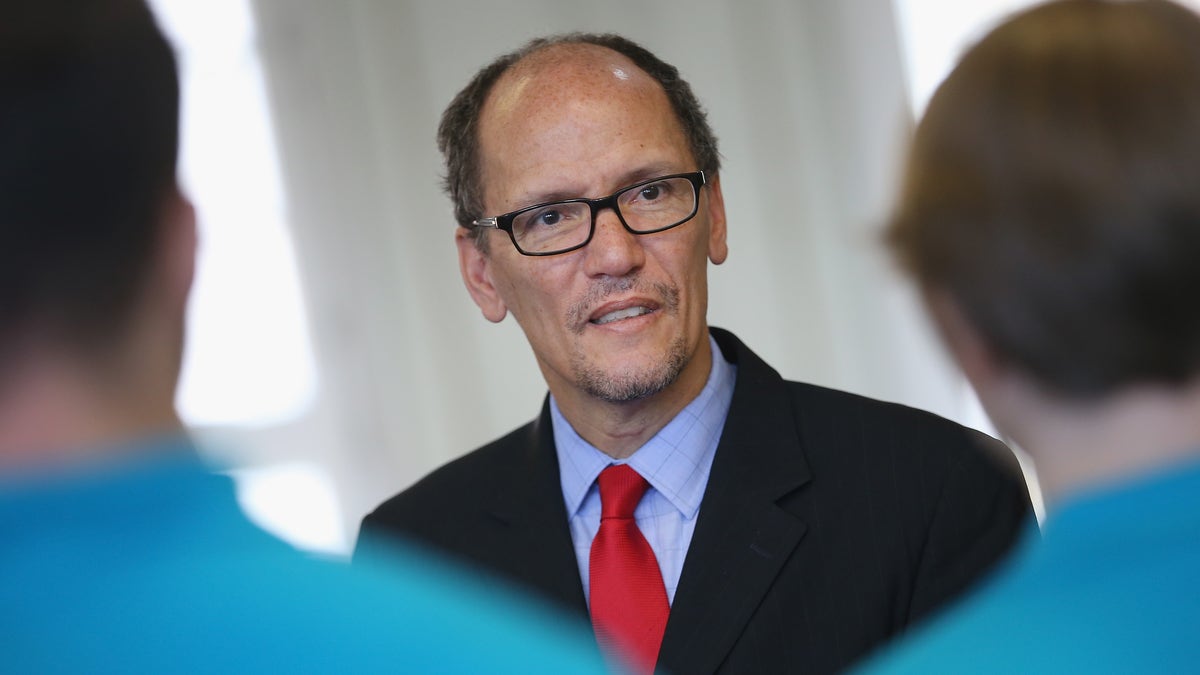
BERLIN, GERMANY - OCTOBER 28: U.S. Labor Secretary Thomas Perez chats with trainees at the Siemens training facility on October 28, 2014 in Berlin, Germany. Secretary Perez visited the center to learn more about the German trainee system, in which manufacturers offer paid multi-year training programs to recent high school graduates. U.S. President Obama has expressed interest in adopting the system in the U.S., where thus far training is usually conducted at technical or community colleges, as a way enhance job growth, meet the job requirements of U.S. industry and make the U.S. economy more competitive. (Photo by Sean Gallup/Getty Images) (2014 Getty Images)
Secretary of Labor Tom Perez, a popular progressive firebrand whose stock has risen as a potential contender to be Hillary Clinton's running mate, is facing questions surrounding a biographical story about his Dominican grandfather, Rafael Brache, whom he often cites during his speeches.
Perez likes to bring up the fact that his grandfather opposed the dictatorship of Rafael Trujillo, who ruled the country for more than three decades in the early 20th century and is accused of multiple human rights violations.
"I remember being able to ask my family where was my grandfather when Trujillo, the horrible dictator in the Dominican Republic, ordered the massacre of 20,000 Haitians," Perez stated recently during his rousing speech to National Association of Latino Elected Officials. "The answer was he spoke up against it, he spoke out against it. He got kicked out and he was on the right side of history."
"And I'm so proud of my grandfather for doing that."
But according to a Wall Street Journal story posted Wednesday, archival records show that Brache was actually an advocate for Trujillo for at least the first five years of the dictator's rule, and even served as the Caribbean strongman's ambassador to the United States in the 1930s.
Citing a state department memo, the Journal reported that in 1935 Brache tried unsuccessfully to arrange a meeting between President Franklin Delano Roosevelt and the Dominican dictator.
According to archival records, however, Perez's grandfather fell out of favor with Trujillo's government later that year in 1935 – meaning he was removed from his post two years before the infamous massacre the he indeed condemned.
Calls to the Labor Department media relations department by Fox News Latino were not returned. A spokesman for the department did speak to the newspaper and said Secretary Perez is proud of Brache.
“Secretary Perez proudly shares the story of his grandfather as told to him by family members because of his grandfather’s commitment to public service, his deep gratitude to the United States for the freedom he found here, and his unyielding belief in the importance of fairness and opportunity for all,” the spokesman said.
Elias Brache, a cousin of Perez, said in an interview with the Wall Street Journal that opposing Trujillo during his iron-fist rule could mean prison and even death.
“It’s a little bit more complicated, honestly, than just saying, ‘OK, he was working for this bad guy once,’ ” he said. “It’s not as simple as that.
Trujillo tortured and killed tens of thousands of civilians during his reign including the 20,000 Haitians in 1937 over what was then cited as a border dispute.
Among other egregious acts, Trujillo also tried to assassinate the Venezuelan president but was later assassinated himself on a dark highway outside of the Dominican capital of Santiago in 1961.












































